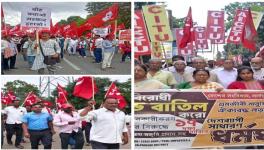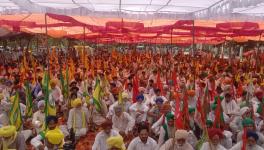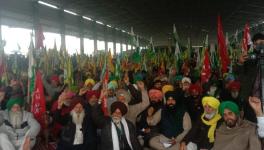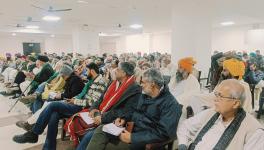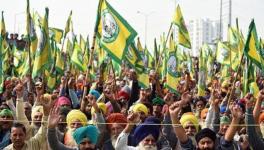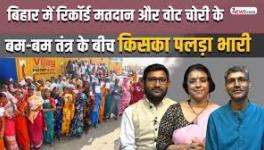Sikkim Elections: Slim Win for SKM But SDF Not Yet Down and Out
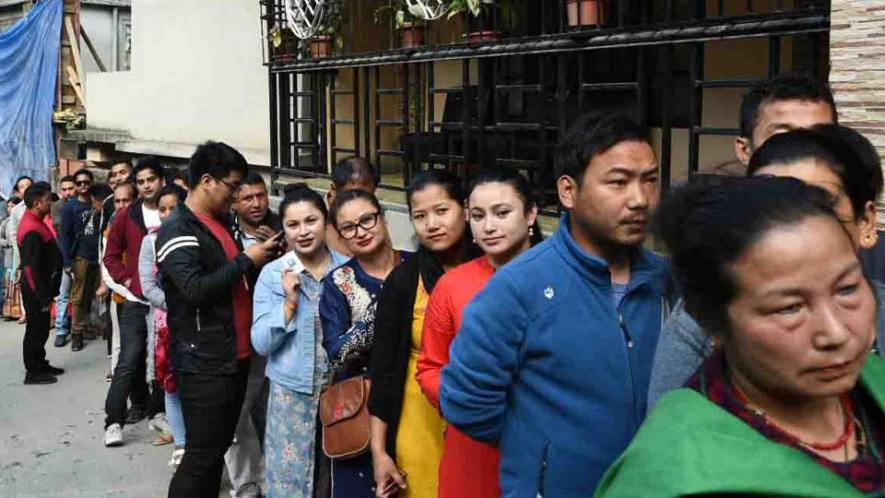
Representational Image. Image Coutesy: ANI
Defying most expectations, the Sikkim Krantikari Morcha (SKM) trounced the 25- year-long rule of the Sikkim Democratic Front (SDF). The grand old party lost by a slim margin of four seats in the 32-member legislative Assembly elections. The Lok Sabha seat, too, went to SKM’s candidate, 30-year-old Indra Hang Subba.
However, the victory of the party was celebrated in the manner most feared in Sikkim. The party workers on May 24 pelted stones at properties owned by SDF members and the Chamling family. Ironically, in Namchi, some of the properties attacked were owned by people who were not in any way connected to the SDF. A house belonging to a contractor from the old settler community (Indian citizens who settled in Sikkim during the time of the King) was also, according to sources, pelted with stones. As was a bakery and cafe owned by the son of an advocate. The vindictiveness of the SKM's party workers was on full display. However, this may not bode well for the newly elected party in six months since bypolls will have to be held in three seats.
The SKM was formed in 2013 four years after Prem Singh Tamang (Golay) who was then in the SDF rebelled against the party. His rebellion at the time was a breath of fresh air in a state ruled by a one-man show. The positive aspect of his rebellion was that for the first time in a long time, people were no longer afraid to criticise the government or the ruling party. Chamling, after consolidating power, had emasculated the Opposition by injecting the notion that to criticise the government or the party was a criminal act. Sycophancy was rewarded and criticism punished. The SDF party workers learned this the hard way in Namchi when the police watched as mute spectators while the SKM vandalised properties.
Also Read | State Opposition Parties Cry Foul over Post-poll Survey in Sikkim
The SKM officially states its ideology as democratic socialism, however, in real terms, the party will be no different from the SDF except with more violence and intimidation.
Former chief minister Pawan Kumar Chamling recently returned from a trip to Delhi where he met with the members of the North East Democratic Alliance (NEDA). His party, the SDF, is a member of this Bharatiya Janata Party (BJP)-led grouping of non-Congress aligned regional and state parties.
The SKM, on the other side, had initially sought an alliance with the saffron party, however, they could not stitch up an alliance as they disagreed on seat sharing. Following this, public opinion in many spheres was that the SKM was still aligned with the BJP. This situation is reminiscent of Nagaland where the Naga People's Front (NPF) was formerly a part of the grouping only to be replaced by the Neiphiu Rio-led Nationalist Democratic Progressive Party (NDPP). This gets more pronounced as the trend in Sikkim is that whichever party wins the lone Lok Sabha seat will align itself with the party in power in the Centre. There is a possibility that the BJP may ditch the SDF. On the other side, the bypolls may force a rethink, particularly if the SDF were to win all three.
Another issue that the SKM will have to grapple with is of who the chief minister will be. Initial reports indicated that Bedu Singh Pant would become the chief minister. Pant is a recent addition to the SKM after he left the SDF before the polls. He is also well regarded by many on both sides. However, a delegation of SKM workers has reportedly handed a memorandum to the governor demanding that Golay be made chief minister. Acting on the memorandum, Golay took oath as the chief minister of Sikkim on May 25. He did not contest the present elections as he had only been released from prison in 2018 after serving a one-year sentence for misappropriating funds. As per section 8(m) of the Representation of the People Act, 1951, a person convicted for an offense under the Prevention of Corruption Act, 1988 and sentenced for a period longer than six months, will be barred from contesting elections for six years after serving the sentence.
Also Read | Elections 2019: Post Poll Talk in Sikkim Suggests SDF’s Return
However, when it comes to the appointment of chief minister, all laws other than the Constitution, are silent. The first clause of Article 164 mentions that the chief minister shall be appointed by the Governor and the other Ministers shall be appointed by the Governor on the advice of the Chief Minister, and the Ministers shall hold office during the pleasure of the Governor. This provision does not prescribe any conditions for the appointment of the Chief Minister.
However, by convention, the party or coalition enjoying majority in the legislative Assembly will be called upon to form the government and a member of that party will invariably be appointed as chief minister. Clause 4 further adds that "A Minister who for any period of six consecutive months is not a member of the Legislature of the State shall at the expiration of that period cease to be a Minister. This provision implies that a person appointed as a Minister need not be a member of the house. A similar situation arose when Conrad Sangma gave up his Lok Sabha seat at Tura to become Chief Minister of Meghalaya in March 2018. However, he had to fight a bye-election within six months, which he won.
In the case of Golay, he can technically be appointed as chief minister. However, by virtue of Section 8(m) of the Representation of the People Act, he cannot contest an election. What follows is that if he is appointed chief minister, his term will only be for six months. One conclusion that may be drawn from the proposal of Golay's name as chief minister is that this is done to avoid infighting in the party.
Kunga Nima Lepcha is clearly a candidate who enjoys the mandate from two constituencies. However, Pant is a veteran politician who has good relations with members on both sides of the aisle. Golay's son, Aditya Golay, won from his father's constituency of Soreng-Chakung with a margin of 208 votes. He, however, is a first-time member of the legislative Assembly. Further given his age, old-timers in the party would not be pleased with him becoming the chief minister and this could lead to a split. What is undeniably likely is that whatever the outcome, of the ‘game of thrones’ or the bye-election, an SKM government will most probably be unstable with several power centres.
Also Read | Can a Former Convict Contest an Election?
Another issue that has been doing the rounds is rumours of a deal struck between the SKM and BJP regarding a merger of Sikkim and the Darjeeling hills. Such a merger would be a win-win for the BJP as it would enable them to claim having fulfilled the aspirations of the Gorkhas in Darjeeling regarding separation from West Bengal.
However, the proposal has few takers in Sikkim. Many in Sikkim feel that such a merger would be detrimental to the state as the people of Darjeeling are perceived as more aggressive and cunning. Thus, the fear is that the people from Darjeeling will end up taking all the opportunities, leaving only scraps for the people of Sikkim.
Since the SKM has utilised hired muscle from Darjeeling and Kalimpong in the run-up to the elections, the notion of a merger deal can be believed by many people in Sikkim. As per information from SDF party workers gathered by Newsclick, people from the bazaar areas, though attending many SDF rallies and placing SDF flags on their businesses, mostly voted for SKM. This double cross will not go unnoticed, particularly since many business owners are not originally from Sikkim. What one would have to be watchful for is whether this will cause the discourse to descend into an ‘insider-outsider’ debate.
Persons with whom Newsclick spoke to from the urban areas have begun to talk about 'influx' as being an issue. Even five years ago, anybody who mentioned the words 'influx' or 'madhisey' -- a pejorative referring to non-mongoloid South Asians from the plains -- in polite urban circles, would invariably be labelled a racist. Both these terms seem to have entered the popular lexicon at present quite seamlessly.
In terms of vote share, the SDF did marginally better than the SKM. While the SKM won with 47.03% of the votes polled, the SDF got 47.63%. Chamling won in the two seats he contested at Namchi-Singithang and Poklok-Kamrang with margins of 377 and 2,899, respectively. Kunga Nima Lepcha of the SKM, too, won in Gangtok and Shyari with margins of 888 and 1,356, respectively. Dorjee Tshering Lepcha of the SDF won in Gnathang-Machong and Martam-Rumtek with margins of 2,920 and 73, respectively.
It would be safe to presume that the candidates in question would give up the seats where they fared better as compared to those where they fared badly. This is despite Chamling telling voters before the polls that he would stick with the seat where he fared better. At present, the stakes are too high to act arrogantly. Thus, following this logic, the bypolls will most likely be held in Poklok-Kamrang, Shyari and Martam.
In Poklok-Kamrang, Chamling won hands down both in terms of the votes polled in the electronic voting machines (EVM) and through postal ballots. The same pattern was repeated in Namchi-Singithang, except with a smaller margin. In Gangtok Kunga Nima Lepcha received the most EVM votes as well as postal ballots. However, in the postal ballots, the margin was of only two votes. The same pattern was repeated in Shyari where the difference in postal ballots was of nine votes. In Gnathang-Machong, Dorjee Tshering Lepcha won the EVM votes with almost double that of his SKM counterpart, the same was reflected in the postal ballots. However, in Martam-Rumtek, he only managed to squeeze past with the help of the postal ballot votes. He lost the EVM votes.
Considering the slim margin in the polls, there is a possibility of the SDF forcing a hung Assembly. If such a circumstance was to arise, the re-election may swing entirely in the SDF’s favour. Gangtok which was long believed to be pro-SKM stronghold, produced a margin of only 888 votes in favour of SKM. The SKM is scrambling and holding rallies and other events perhaps as a show of force. However, the grand old party is not yet down and out.
Get the latest reports & analysis with people's perspective on Protests, movements & deep analytical videos, discussions of the current affairs in your Telegram app. Subscribe to NewsClick's Telegram channel & get Real-Time updates on stories, as they get published on our website.










